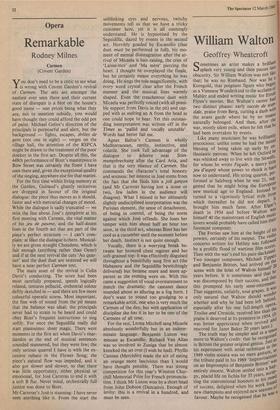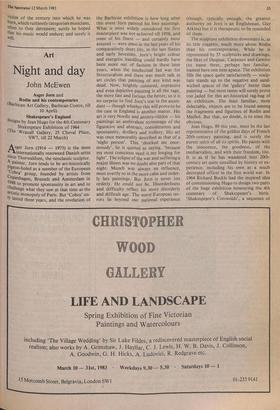William Walton
Geoffrey Wheatcroft
Sometimes an artist makes a brilliant splash very young and then passes into obscurity. Sir William Walton was not like that; he was no Rimbaud. Nor was he a Korngold, that poignant figure who began, as a Viennese Wunderkind to the acclaim Mahler and ended writing music for Erroll Flynn's movies. But Walton's career had two distinct phases: early succes de scan" dale, praise from Berg, cutting a dash with the avant garde where he by no meal's naturally belonged. And then, after the war, mostly silent exile, when he felt that he had been overtaken by events. Like many musicians he was brilliantly precocious; unlike some he had the Mixed blessing of being taken up early by e°- thusiastic patrons. When he left Oxford he was whisked away to live with the Sitwells' for whom he wrote Façade, a merry Jew d'esprit whose power to shock is hard now to understand. His string quartet, Per- formed at Salzburg when he was 21, sug' gested that he might bring the EuroPeo° new musical age to England. Instead he turned to a vigorously lyrical style fro 1,, which thereafter he did not depart. ;` brought him much fame. After gigot' s, death in 1934 and before Walton v`18' himself 40 the mainstream of English Mtial.e lovers would probably have called him their foremost composer. The Forties saw him at the height of .is powers, certainly of his output. The vi nTld little, concerto written for Heifetz was followed by a prolific flood of wartime film scores. Then with the war's end his pace slackened; Two younger composers, Michael TiPPe! and Benjamin Britten, had arrived on tn0 scene with the eclat of Walton himself 2 years before. It is sometimes said that be was discomposed by their success, and that , this prompted his early semi-retirenien's That suggestes, unfairly, sour grapes. It only natural that Walton should viren!`),.le whether and why lie had been left beinny, especially after his one full-length opera ,_ Troilus and Cressida, received less than the praise it deserved at its premiere in 1954. ( A was better appreciated when revived an rescored for Janet Baker 20 years later.) The truth may be simpler and in a sena; more to Walton's credit: that lie recogniseas in Britten the greater original genius. .11.1athe his experiment with serial technique in t",„ 1949 violin sonata was no mere gesture! sys the tribute paid in his 1969 ' Improvisat10,11.1 on an Impromptu of Benjamin Britten, 1"° entirely sincere. Walton settled into a 110.1/: py, placid life on Ischia for 35 years, neeePA tin g the conventional honours as his feed of success, delighted when his work foun of new champions and enjoyed new seasons a favour. Maybe he recognised that he was victim of the century into which he was born, which' ruthlessly'categorises musicians, often to their detriment; surely he hoped
that his music would endure; and surely it will.











































 Previous page
Previous page